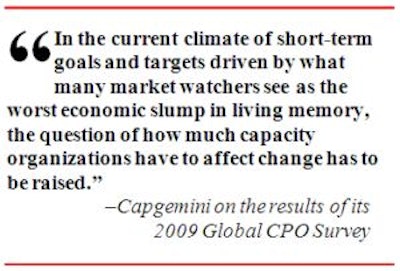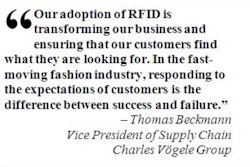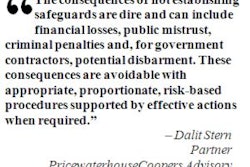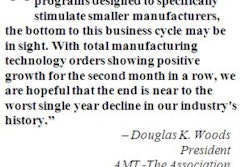
New York — August 24, 2009 — The global financial crisis has "exponentially" increased pressure on Procurement to deliver cost reductions as businesses struggle to sustain profitability, or even survival, in the face of a turbulent economy, according to the latest survey of chief procurement officers from consulting firm Capgemini.
In its third Global Chief Procurement Officer (CPO) Survey, Capgemini reports that the key to successfully navigating the economy's rapids will be reacting quickly but also attacking the "right" problems. "Winners in the current climate will be those procurement professionals who are able to focus on the real issues and demonstrate an agile approach to adjusting rapidly to the unprecedented challenges facing them," the consultancy writes.
The intent of the Global CPO Survey is to provide executives with insight into both macro issues and focus areas so they may be better informed concerning the challenges they face and the decisions they make. The survey is based around responses from more than 150 organizations spanning Europe, North America and Asia Pacific, mainly represented by senior procurement executives.
The latest survey provides a "temperature check" on the world of buying in 2009 and gives a comparison of findings from previous Surveys conducted in 2007 and 2008. The survey also represents a diversity of industries ranging from Energy to Pharmaceuticals and Manufacturing to the Public Sector. "What is common to all respondent organizations is the continuing theme of having to manage and drive value out of third party expenditure," according to Capgemini.
This year's survey provides insight into the impact of the global recession on procurement executives, with nearly seven in 10 participants acknowledging that the current economic recession was having a significant impact on them: increasing targets, altering focus areas and shortening planning time horizons. For many, savings targets have doubled from those that prevailed when the consultants last conducted the Global CPO Survey, and in some cases these savings are a clear requirement for survival.
"Clearly as revenue performance diminishes, companies are seeking to reduce operating costs to support the balance sheet, and as a major lever of cost control procurement is clearly in the spotlight," Capgemini reports. "The response to this focus appears to comprise short-term objectives in the main: top of the list of current initiatives for procurement is the tactical renegotiation of existing contracts in an attempt to slash spend and reflect reduced demand."
The other main activities being pursued target enhanced supplier management and raising the profile of procurement across the organization. Even these can be tracked directly to short-term goals as opposed to more strategic, longer term objectives, the consultants note.
"One of the concerns we regularly encounter from company to company is that of unforeseen bankruptcies within the supply base," Capgemini adds. "The fear is the unquantified effect this would have on downstream product and service provision. The response around supplier management therefore is far more attuned to risk mitigation as opposed to the more traditional aims of development and innovation."
 The consultants also suggest that Procurement's desire to raise its profile in the enterprise can be linked to a need to collaborate better with stakeholders, internal customers, suppliers and end user groups to drive lower-cost fit-for-purpose specifications.
The consultants also suggest that Procurement's desire to raise its profile in the enterprise can be linked to a need to collaborate better with stakeholders, internal customers, suppliers and end user groups to drive lower-cost fit-for-purpose specifications.
"We would conjecture that part of this is to move procurement behaviors from buying what is wanted to buying what is needed," Capgemini writes. "All of these characteristics are consistent with the harsh environment procurement and organizations alike are currently operating in. These results are consistent regardless of industry sector or geography and show the true nature and impact of the global economy.
The consultancy does see significant consistency with the themes from last year's survey in terms of areas of investment and improvement being pursued by CPOs:
"What is striking about the issues raised by senior procurement executives is the consistency with findings from previous years. It seems that while the problems are now well recognized, progress with resolving them is occurring at a slow pace," Capgemini writes.
The consultants suggest that one possible explanation for this is a failure to see the integrated nature of such problems. "Rather, activities are focused on solving what are seen as discrete issues leading to unsustainable solutions. In the current climate of short-term goals and targets driven by what many market watchers see as the worst economic slump in living memory, the question of how much capacity organizations have to affect change has to be raised," according to the consultancy.
In addition, Capgemini believes that so last as companies fail to apply "lasting solutions" to their challenges, they will continue to come up short in terms of the tools, capabilities and operating models to address a long-term strategic agenda. "For those who can break out of this detrimental cycle there is a clear opportunity to drive competitive advantage for their respective organizations. In no small measure these businesses will help define the winners and losers that emerge from the current economic cycle," the consultancy concludes.
The full 2009 CPO study is available (registration required) at www.capgemini.com/resources/thought_leadership/global_chief_procurement_officer_survey_2009/.
In its third Global Chief Procurement Officer (CPO) Survey, Capgemini reports that the key to successfully navigating the economy's rapids will be reacting quickly but also attacking the "right" problems. "Winners in the current climate will be those procurement professionals who are able to focus on the real issues and demonstrate an agile approach to adjusting rapidly to the unprecedented challenges facing them," the consultancy writes.
The intent of the Global CPO Survey is to provide executives with insight into both macro issues and focus areas so they may be better informed concerning the challenges they face and the decisions they make. The survey is based around responses from more than 150 organizations spanning Europe, North America and Asia Pacific, mainly represented by senior procurement executives.
The latest survey provides a "temperature check" on the world of buying in 2009 and gives a comparison of findings from previous Surveys conducted in 2007 and 2008. The survey also represents a diversity of industries ranging from Energy to Pharmaceuticals and Manufacturing to the Public Sector. "What is common to all respondent organizations is the continuing theme of having to manage and drive value out of third party expenditure," according to Capgemini.
This year's survey provides insight into the impact of the global recession on procurement executives, with nearly seven in 10 participants acknowledging that the current economic recession was having a significant impact on them: increasing targets, altering focus areas and shortening planning time horizons. For many, savings targets have doubled from those that prevailed when the consultants last conducted the Global CPO Survey, and in some cases these savings are a clear requirement for survival.
"Clearly as revenue performance diminishes, companies are seeking to reduce operating costs to support the balance sheet, and as a major lever of cost control procurement is clearly in the spotlight," Capgemini reports. "The response to this focus appears to comprise short-term objectives in the main: top of the list of current initiatives for procurement is the tactical renegotiation of existing contracts in an attempt to slash spend and reflect reduced demand."
The other main activities being pursued target enhanced supplier management and raising the profile of procurement across the organization. Even these can be tracked directly to short-term goals as opposed to more strategic, longer term objectives, the consultants note.
"One of the concerns we regularly encounter from company to company is that of unforeseen bankruptcies within the supply base," Capgemini adds. "The fear is the unquantified effect this would have on downstream product and service provision. The response around supplier management therefore is far more attuned to risk mitigation as opposed to the more traditional aims of development and innovation."
 The consultants also suggest that Procurement's desire to raise its profile in the enterprise can be linked to a need to collaborate better with stakeholders, internal customers, suppliers and end user groups to drive lower-cost fit-for-purpose specifications.
The consultants also suggest that Procurement's desire to raise its profile in the enterprise can be linked to a need to collaborate better with stakeholders, internal customers, suppliers and end user groups to drive lower-cost fit-for-purpose specifications."We would conjecture that part of this is to move procurement behaviors from buying what is wanted to buying what is needed," Capgemini writes. "All of these characteristics are consistent with the harsh environment procurement and organizations alike are currently operating in. These results are consistent regardless of industry sector or geography and show the true nature and impact of the global economy.
The consultancy does see significant consistency with the themes from last year's survey in terms of areas of investment and improvement being pursued by CPOs:
- Organizations continuing to struggle to unlock the intrinsic value within IT solutions. More than 60 percent of respondents acknowledged that less than 20 percent of spend utilized e-procurement tools despite significant investment made in technology.
- Perhaps connected to this, spend visibility remains a key problem and for the second year running is the top issue facing CPOs.
- The issue of talent continues to be a front of mind issue and, along with the pressure for economic results, has become more acute for procurement functions struggling to execute effective strategies.
- Supplier management has come into focus as organizations recognize the risk of vendor failures within the supply chain.
- Organizational design continues to adapt to circumstance as respondents seek to balance end user intimacy with the needs for control and consistency.
"What is striking about the issues raised by senior procurement executives is the consistency with findings from previous years. It seems that while the problems are now well recognized, progress with resolving them is occurring at a slow pace," Capgemini writes.
The consultants suggest that one possible explanation for this is a failure to see the integrated nature of such problems. "Rather, activities are focused on solving what are seen as discrete issues leading to unsustainable solutions. In the current climate of short-term goals and targets driven by what many market watchers see as the worst economic slump in living memory, the question of how much capacity organizations have to affect change has to be raised," according to the consultancy.
In addition, Capgemini believes that so last as companies fail to apply "lasting solutions" to their challenges, they will continue to come up short in terms of the tools, capabilities and operating models to address a long-term strategic agenda. "For those who can break out of this detrimental cycle there is a clear opportunity to drive competitive advantage for their respective organizations. In no small measure these businesses will help define the winners and losers that emerge from the current economic cycle," the consultancy concludes.
The full 2009 CPO study is available (registration required) at www.capgemini.com/resources/thought_leadership/global_chief_procurement_officer_survey_2009/.











